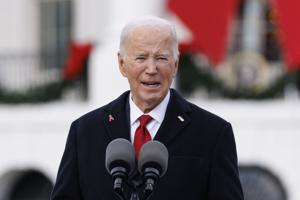As I was scrolling through my news feed, I came across an article that made me pause for a moment. It seemed like a straightforward report about President Joe Biden’s decision on providing protections for transgender student-athletes, but what caught my attention was the headline itself.
The headline read: “President Biden drops unfinished protections for trans athletes.” Now, at first glance, it might seem like a neutral or even objective title. However, upon closer inspection, I realized that this headline could be perceived as misleading and unfair to the transgender community.
As someone who is passionate about promoting equality and inclusivity for all individuals, regardless of their gender identity, I couldn’t help but feel frustrated with this particular headline. It implies that President Biden has abandoned or given up on providing protections for these students, which isn’t entirely accurate.
The article itself didn’t provide any further context or clarification on what exactly happened, but it’s clear that the language used in the headline is intentionally chosen to be provocative and sensationalized. This kind of reporting can have a disproportionate impact on marginalized communities, perpetuating negative stereotypes and reinforcing existing biases.
As we continue to navigate complex social issues like LGBTQ+ rights, it’s essential that we prioritize accuracy, empathy, and understanding in our reporting. We must strive to create a media landscape that amplifies the voices and experiences of underrepresented groups, rather than exploiting them for clicks or ratings.
In this case, I believe that ESPN could have done better by using more nuanced language in their headline. Instead of implying abandonment or failure on President Biden’s part, they could have simply stated that the protections were not finalized or completed as planned. This would have been a much more fair and accurate representation of the situation.
As we move forward, it’s crucial that we hold ourselves and our media outlets to higher standards. We must be willing to challenge simplistic or misleading headlines, instead opting for language that promotes understanding and respect. By doing so, we can create a more inclusive and equitable society where everyone has the opportunity to thrive.
In conclusion, I believe that this incident highlights the importance of responsible journalism in promoting social justice and equality. As advocates for LGBTQ+ rights, it’s our duty to speak out against misinformation and advocate for accurate representation in the media. By doing so, we can work towards a more just and inclusive world where everyone is treated with dignity and respect.

